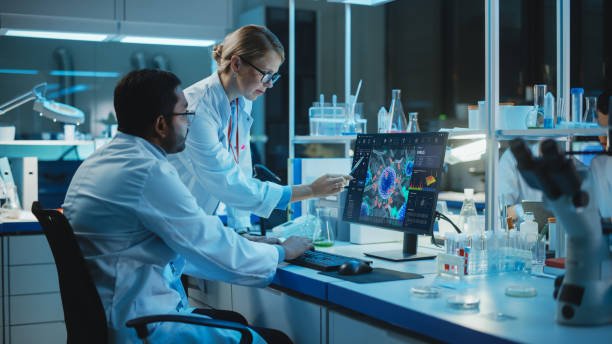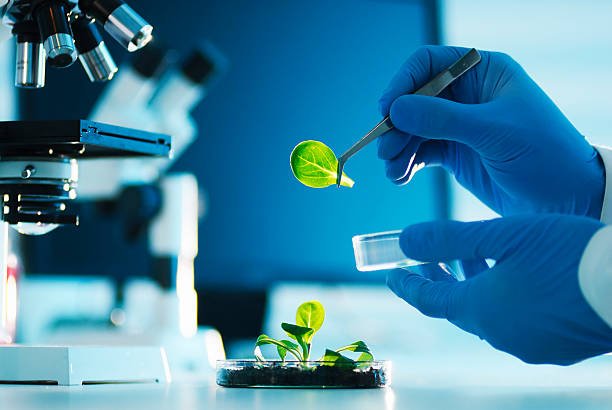What is Biotechnology
Biotechnology is a field that merges biology with technology to develop products and technologies that improve our lives, health and environment. It involves using biological systems organisms or their derivatives to create new products or modify existing products for specific purposes.
what is Biotechnology
Biotechnology - Biotechnology is a field that merges biology with technology to develop products and technologies that improve our lives, health and environment. It involves using biological systems organisms or their derivatives to create new products or modify existing products for specific purposes.
Basic details of biotechnology
1. Applications Biotechnology has diverse applications in various fields including health care, agriculture , food production, environmental management and industrial processes.
2. Health care In health care biotechnology is used for drug discovery therapeutic development vaccines diagnostics and gene therapy. It has made significant contributions in treating diseases and improving human health.
3. Agriculture Biotechnology plays an important role in agriculture by developing genetically modified crops with improved traits such as increased yield resistance to pests and diseases and tolerance to environmental stresses. This helps in improving crop productivity and sustainability
4. Industrial biotechnology uses biological systems or processes to produce industrial products such as biofuels, enzymes , chemicals and materials in a more sustainable and eco-friendly way than traditional methods.
Environmental Biotechnology. This branch focuses on using biological processes to address environmental issues such as pollution prevention, waste management and sustainable resource use. Examples include.
Bioremediation and wastewater treatment of contaminated sites.
Tools and Techniques
Biotechnology uses various tools and techniques such as genetic engineering, recombinant DNA technology, molecular biology bioinformatics and fermentation processes to manipulate biological systems for desired outcomes.
Ethical and regulatory considerations. The use of biotechnology raises ethical concerns regarding genetic modification cloning and potential impacts on ecosystems and human health. Regulatory frameworks are in place to ensure safety ethical standards and proper management of biotechnology applications.
Overall biotechnology offers immense potential to address global challenges improve human well-being and promote sustainable development through innovative biological solutions.
Types of Biotechnology
Some major types of biotechnology with examples :
1. Medical Biotechnology
Pharmaceutical Biotechnology It involves the development of drugs and therapeutics using biotechnological techniques. Example Insulin is produced through recombinant DNA technology for the treatment of diabetes.
Gene therapy Involves the introduction, removal or modification of genes within a person's cells to treat or prevent disease.
Diagnostic biotechnology This involves the development of diagnostic tests and devices to detect diseases or monitor health conditions. Example Polymerase chain reaction (PCR) to detect the genetic material of pathogens such as viruses or bacteria.
2 Agricultural Biotechnology
Genetically modified organisms (GMO) Involves the genetic modification of plants or animals to enhance desirable traits such as increased yield pest resistance or nutritional content. Example Bt cotton which produces proteins toxic to some insects.
Crop improvement This involves breeding and genetic engineering techniques to develop crops with improved characteristics such as drought tolerance disease resistance or nutrient efficiency.
3. Industrial Biotechnology
Biofuel production This involves the use of microorganisms or enzymes to convert biomass into biofuels such as ethanol or biodiesel. Example Fermentation of sugars by yeast to produce ethanol from corn or sugarcane. Enzyme production Involves production of enzymes through microbial fermentation for various industrial applications such as detergent textile and food processing. Example Amylase enzyme used in starch hydrolysis for ethanol production.
4. Environmental Biotechnology
Bioremediation This involves the use of microorganisms or plants to detoxify or degrade pollutants in soil water or air. Example Oil breaking bacteria are used to clean up oil spills in the marine environment.
Waste treatment Involves the use of biological processes to treat organic waste and waste water reducing environmental pollution. Example Activated sludge process using bacteria to break down organic matter in wastewater treatment plants.
These are just a few examples and biotechnology is constantly evolving offering innovative solutions to a variety of challenges in the health care agriculture industry and the environment.
What's Your Reaction?




















